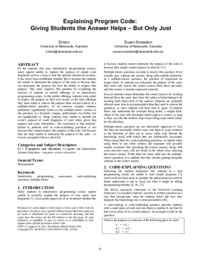Explaining program codegiving students the answer helps - but only just
Simon, Susan Snowdon
Publikationsdatum:
Zu finden in: ICER 2011 (Seite 93 bis 100), 2011
|
 |
 Diese Seite wurde seit 1 Jahr inhaltlich nicht mehr aktualisiert.
Unter Umständen ist sie nicht mehr aktuell.
Diese Seite wurde seit 1 Jahr inhaltlich nicht mehr aktualisiert.
Unter Umständen ist sie nicht mehr aktuell.
 Zusammenfassungen
Zusammenfassungen
Of the students who pass introductory programming courses, many appear unable to explain the purpose of simple code fragments such as a loop to find the greatest element in an array. It has never been established whether this is because the students are unable to determine the purpose of the code or because they can determine the purpose but lack the ability to express that purpose. This study explores that question by comparing the answers of students in several offerings of an introductory programming course. In the earlier offerings students were asked to express the purpose in their own words; in the later offerings they were asked to choose the purpose from several options in a multiple-choice question. At an overseas campus, students performed significantly better on the multiple-choice version of the question; at a domestic campus, performance was better, but not significantly so. Many students were unable to identify the correct purpose of small fragments of code when given that purpose and some alternatives. The conclusion is that students' failure to perform well in code-explaining questions is not because they cannot express the purpose of the code, but because they are truly unable to determine the purpose of the code - or even to recognize it from a short list.
 Dieses Konferenz-Paper erwähnt ...
Dieses Konferenz-Paper erwähnt ...
 Zitationsgraph
Zitationsgraph
 Zitationsgraph (Beta-Test mit vis.js)
Zitationsgraph (Beta-Test mit vis.js)
 3 Erwähnungen
3 Erwähnungen 
- ICER 2018 - Proceedings of the 2018 ACM Conference on International Computing Education Research, ICER 2018, Espoo, Finland, August 13-15, 2018 (Lauri Malmi, Ari Korhonen, Robert McCartney, Andrew Petersen) (2018)
- Programming Misconceptions for School Students (Alaaeddin Swidan, Felienne Hermans, Marileen Smit) (2018)


- Programming Misconceptions for School Students (Alaaeddin Swidan, Felienne Hermans, Marileen Smit) (2018)
- How Machine Learning impacts the Undergraduate Computing Curriculum (R. Benjamin Shapiro, Rebecca Fiebrink, Peter Norvig) (2018)


- Informatics in Schools. Beyond Bits and Bytes: Nurturing Informatics Intelligence in Education - 16th International Conference on Informatics in Schools: Situation, Evolution, and Perspectives, ISSEP 2023, Lausanne, Switzerland, October 23–25, 2023 (Jean-Philippe Pellet, Gabriel Parriaux) (2023)


- Investigating the Role of ChatGPT in Supporting Text-Based Programming Education for Students and Teachers (Markus Wieser, Klaus Schöffmann, Daniela Stefanics, Andreas Bollin, Stefan Pasterk)


- Investigating the Role of ChatGPT in Supporting Text-Based Programming Education for Students and Teachers (Markus Wieser, Klaus Schöffmann, Daniela Stefanics, Andreas Bollin, Stefan Pasterk)
 Anderswo finden
Anderswo finden
 Volltext dieses Dokuments
Volltext dieses Dokuments
 |  Explaining program code: Fulltext at the ACM Digital Library ( Explaining program code: Fulltext at the ACM Digital Library ( : :  , 489 kByte; , 489 kByte;  : :  Link unterbrochen? Letzte Überprüfung: 2020-11-28 Letzte erfolgreiche Überprüfung: 2020-07-28) Link unterbrochen? Letzte Überprüfung: 2020-11-28 Letzte erfolgreiche Überprüfung: 2020-07-28) |
 Anderswo suchen
Anderswo suchen 
 Beat und dieses Konferenz-Paper
Beat und dieses Konferenz-Paper
Beat hat Dieses Konferenz-Paper während seiner Zeit am Institut für Medien und Schule (IMS) ins Biblionetz aufgenommen. Beat besitzt kein physisches, aber ein digitales Exemplar. Eine digitale Version ist auf dem Internet verfügbar (s.o.). Aufgrund der wenigen Einträge im Biblionetz scheint er es nicht wirklich gelesen zu haben. Es gibt bisher auch nur wenige Objekte im Biblionetz, die dieses Werk zitieren.











 Biblionetz-History
Biblionetz-History